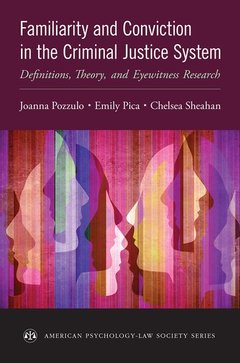Familiarity and Conviction in the Criminal Justice System Definitions, Theory, and Eyewitness Research American Psychology-Law Society Series
Langue : Anglais
Auteurs : Pozzulo Joanna, Pica Emily, Sheahan Chelsea

Eyewitness research has focused mainly on stranger identification, but identification is also critical for the "familiar stranger", and understanding how variability in an eyewitness's familiarity with the perpetrator may influence recall and recognition accuracy will facilitate swifter and more just resolutions to crime. Familiarity and Conviction in the Criminal Justice System examines the notion of familiarity between an eyewitness/victim and a perpetrator, ranging from complete unfamiliarity (as with a total stranger) to a very familiar other. Authors Joanna Pozzulo, Emily Pica, and Chelsea Sheahan define what is meant by "familiarity" in an eyewitness context and how it has been operationalized and manipulated, exploring factors that may interact with familiarity and examining jurors' perceptions of it. The first half of the book draws on various sub-areas of psychology to understand familiarity against the backdrop of eyewitness identification: social psychology theories of how familiarity is established; cognitive psychology and its theories of recognition; face processing literature; and eyewitness literature. The second half of the book surveys system and estimator variables that influence identification, such as lineup procedures, interviewing techniques, the role of age, race, and more; as well as how familiarity is weighed in juror decision-making. A final chapter issues a call for continuing research examining the notion of familiarity and its impact on the criminal justice system.
Joanna Pozzulo is a Full Professor and the Chair of the Department of Psychology at Carleton University. Dr. Pozzulo's research and teaching broadly falls under the domain of Forensic Psychology (borrowing from developmental, social, and cognitive psychology). Dr. Pozzulo has published widely on the "young eyewitness". Emily Pica is an assistant professor in the Department of Psychological Science and Counseling at Austin Peay State University. Dr. Pica's research interests include ways in which we can improve identification accuracy, factors that influence jurors' decision making, and the perceptions of the wrongfully convicted. Chelsea Sheahan is an Adjunct Professor at Carleton University. Her research focuses primarily on factors that impact eyewitness memory within a developmental context. Her secondary research interests are broadly in the area of juror decision making and corrections.
Date de parution : 12-2019
Ouvrage de 144 p.
23.1x15.5 cm
Thème de Familiarity and Conviction in the Criminal Justice System :
© 2024 LAVOISIER S.A.S.
